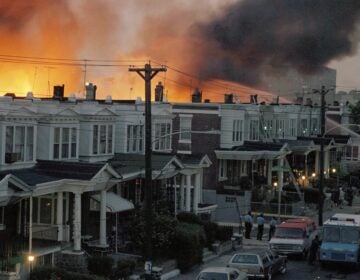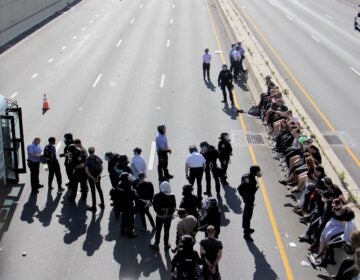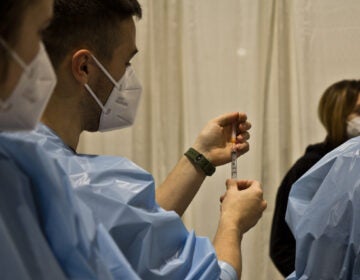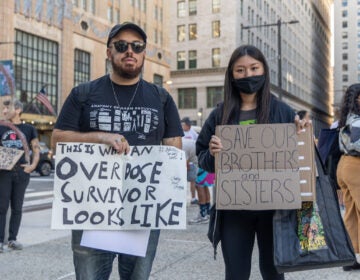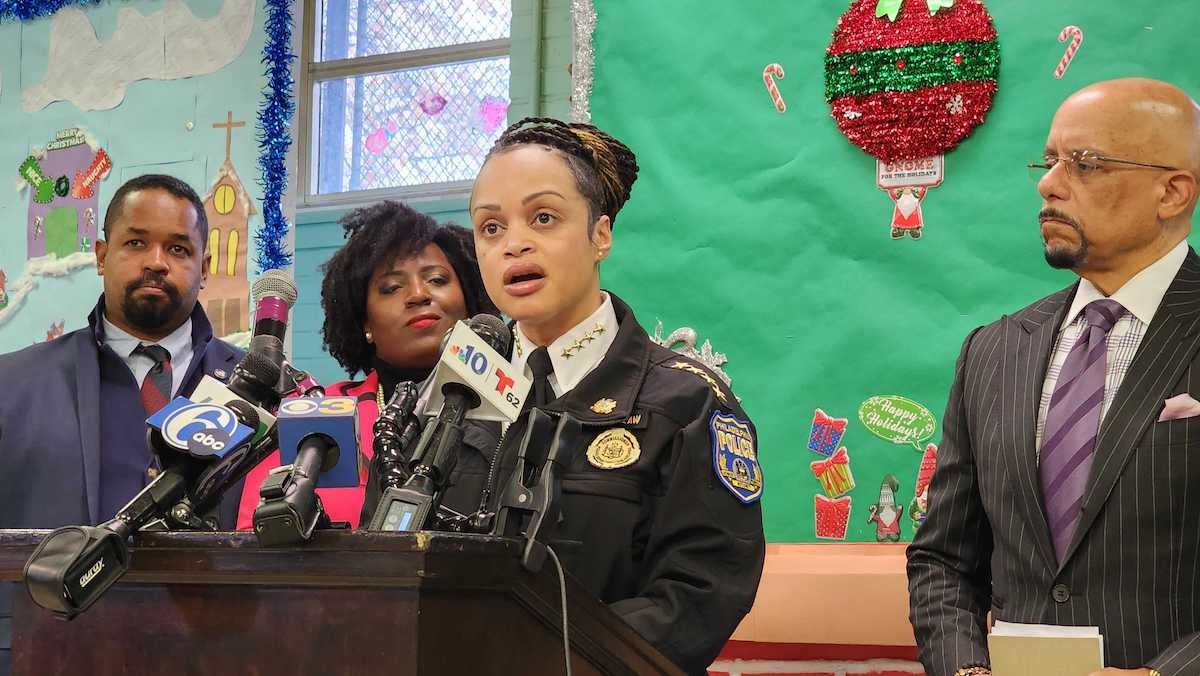‘You have to ask yourself: When does the mayor resign?’: Philly critiques a struggling Kenney administration
In interviews, community leaders and regular citizens said their trust in Kenney’s leadership has eroded. Some blamed his style of delegating authority.
Listen 5:01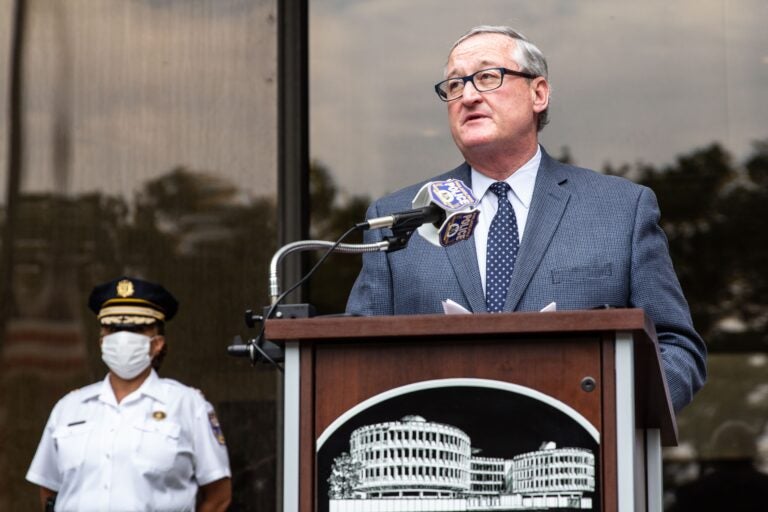
Philadelphia Mayor Kenney speaks at a June 2020 press conference. (Kimberly Paynter/WHYY)
A gun violence epidemic that shows no sign of easing. Questionable decision-making that set the city’s vaccination rollout off course just as it was beginning. Aggressive police tactics against peaceful protesters rallying against police brutality after the murder of George Floyd. And yet another debacle, the mishandling of recently rediscovered remains on top of decades of pain stemming from the city-sanctioned 1985 MOVE bombing.
Health Commissioner Dr. Thomas Farley, who had a key role in two of those recent scandals, stepped down last month. But many Philadelphians place blame squarely on the man who hired Farley and runs the show at City Hall.
They’ve lost trust in Mayor Jim Kenney, they say.
“Of course, Dr. Farley should’ve resigned. There’s no question about that. But is he the only person that should resign? And I think that’s a deeper question,” said Rev. Mark Kelly Tyler of Mother Bethel of AME Church.
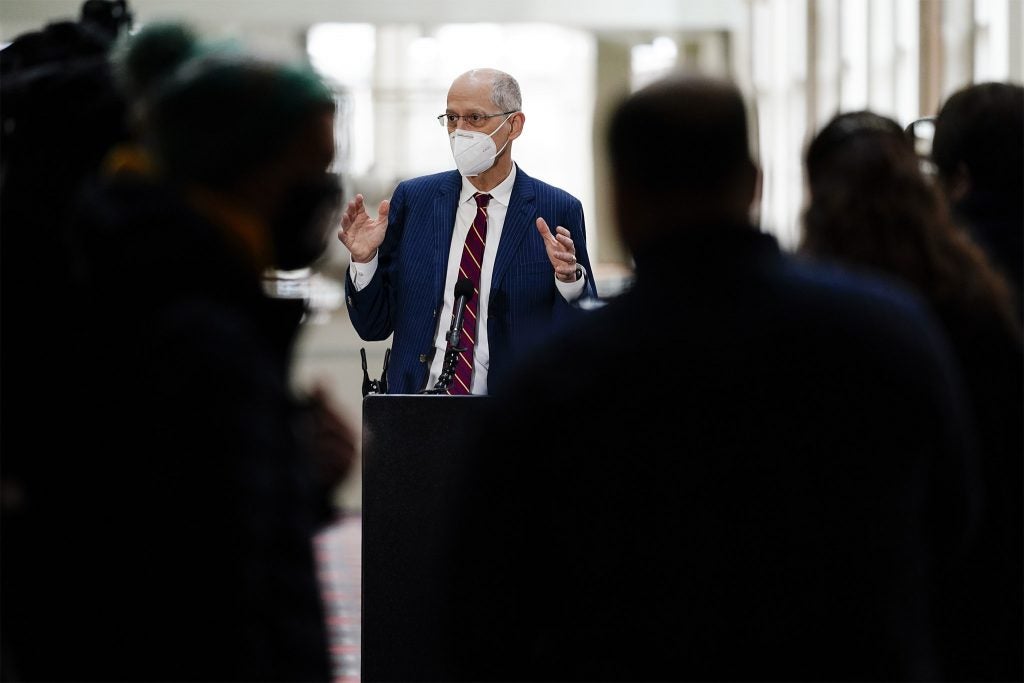
In interviews with WHYY News, community leaders and regular citizens alike said their trust in Kenney’s leadership had eroded long before the news of Farley’s connection to the MOVE remains broke. Among the issues some cited were the tear-gassing of an area considered to be Black West Philly’s main street, raging gun violence that has many families prematurely burying loved ones, and a governmental response to the pandemic that left people of color disproportionately killed by COVID-19 and vaccinated at a lower rate.
Tyler’s relationship with the mayor did not completely falter after disagreements over Kenney’s handling of the city’s controversial stop-and-frisk policy — last June’s police tear-gassing of protesters did that.
“We went through this last year with tear-gassing of citizens, something that had not happened since the MOVE bombing, ironically,” Tyler said.
A report from City Controller Rebecca Rhynhart blamed a “failure of leadership” at the highest levels. While Police Commissioner Danielle Outlaw granted the request from an officer to use tear gas, it came only after Kenney reluctantly relinquished the option to use it to Outlaw.
“At a certain point, in an administration that continues to do things like this, you have to ask yourself: When does the mayor resign?” Tyler said.
Abdul-Aliy Muhammad, co-founder of the Black and Brown Workers Cooperative, said tear-gassing the protesters on I-676 was a prime example of a situation illustrating that Kenney is incapable of leading.
“Kenney often does this thing where he defers big decisions to people under him, so that when something goes down, Kenney can say, ‘Well, I didn’t do it,’” Muhammad said. “He did it with Farley, like, ‘Farley knew. I didn’t know. Farley decided. I didn’t decide. Farley did this in 2017. I had no idea.’ You’re the mayor of the city, Jim. You need to resign.”
Eboni Zamani, a filmmaker and photographer who lives in Philadelphia, posed this question, alluding to the MOVE bombing as well as the recent revelations about some of the victims’ remains: Why should she believe the words of city leaders today when they haven’t held themselves to account for the choices of yesterday?
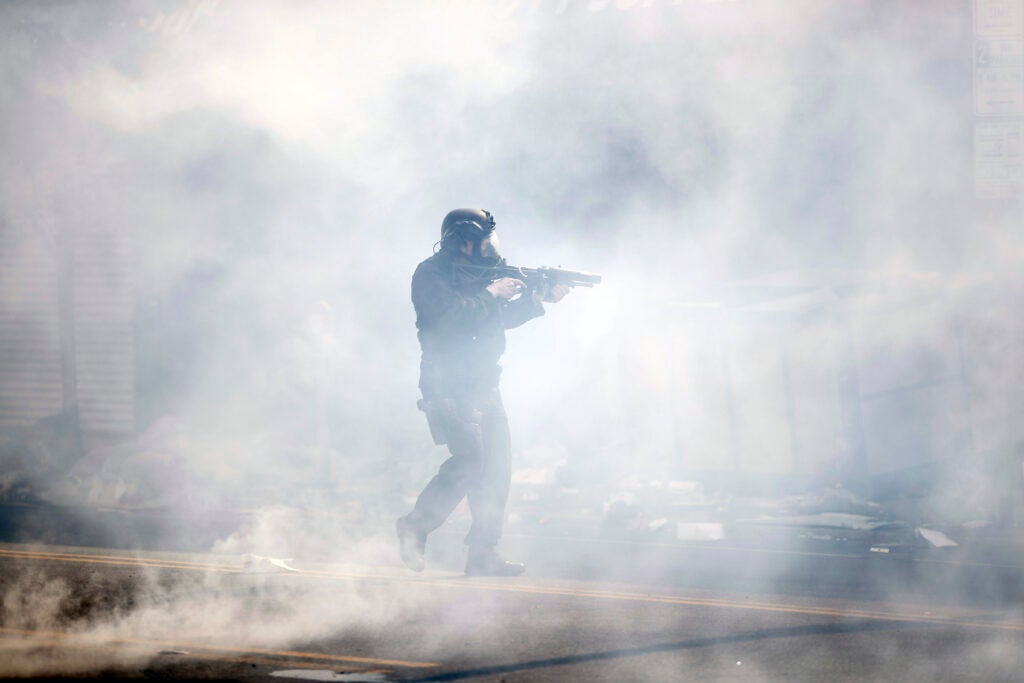
WHYY News reached out to Kenney’s office and asked for an interview with the mayor. Though the mayor’s office said it couldn’t accommodate the request, Deana Gamble, Kenney’s communications director, provided a statement.
“The mayor can appreciate that some Philadelphians’ trust in him may have wavered, but he hopes that residents also appreciate the innumerable challenges the city faced over the last 5 ½ years that caused him to make some very difficult decisions,” Gamble said. “He and his team do not always get it right, but Mayor Kenney also never shies away from taking accountability when we get it wrong. He acknowledges the administration’s errors, takes swift actions to correct them, learn from them, and do better in the future.”
As for the delegative management style some say Kenney employs, Gamble acknowledged the perception.
“He is also proud of the fact that he places trust in people he appoints to leadership roles, and is the first to admit that he doesn’t micromanage his staff. This has always been his leadership style and served the administration well,” Gamble said.
Barbara Ferman, a political science professor at Temple University who specializes in urban politics, said that Kenney’s campaign of progressivism led to some good outcomes at the start of his administration in 2016 — but that things quickly turned into a “disappointment.”
“And I want to put that in the larger context of saying that being the mayor of Philadelphia is an impossible job, OK, and he’s mayor at a time dealing with all this this stuff after the murder of George Floyd and the pandemic — I mean, I can’t even imagine what it’s like to be in a position of power during that time … But I think the way he’s handled it has not been the best,” Ferman said.
“He does appear to be a pretty hands-off mayor,” Ferman said. “If you have top-notch people that … you trust with your life — that can work. But clearly, there were issues with some of these people. So I think his trust or confidence, whatever, might have been misplaced.”
And fostering good relationships with the community isn’t helped when an administration has staff turnover. Kenney is on his third managing director, his second police commissioner, and soon his second health commissioner.
Stop-and-frisk, MOVE, Philly Fighting COVID…
As a community leader, Tyler said, he had a good relationship with “Councilman Kenney” and even mayoral “candidate Kenney.” But he said that soon soured over the city’s stop-and-frisk policy. Tyler accused Kenney of flip-flopping on what he believed was a campaign promise to end the policy.
“Shortly after his election, we had a town hall, where he showed up along with the new [Police] Commissioner Richard Ross. And they stood there and inside of a packed congregation, and he then said to us that he never said that, and the room just exploded,” Tyler said.
“The meeting was so chaotic that the pastor at the time had to put everyone out of the building,” Tyler said. “And [Kenney] was angry with us as community groups, saying we set him up, and I’m like, ‘I can’t believe that you don’t understand why people are angry at you.’”
A 2016 Billy Penn article deemed Kenney’s stance on the issue a “Half Flip” because despite the nuance he provided in some campaign materials, “multiple statements given to reporters along the trail, though, spoke to ceasing the practice absolutely.”
City Councilmember Isaiah Thomas has been a critic of stop-and-frisk, which he said has become a “rite of passage” for young Black men in Philadelphia.
In an interview, Thomas did not speak to whether Kenney had flipped on the issue. In fact, he said that City Council and the administration were in talks regarding traffic-stop protocol in the city. In recent years, traffic stops have come under increased scrutiny here and nationwide.
“Where we are right now with the administration is we are in dialogue as it relates to the motor vehicle code and how we enforce it here in the city of Philadelphia. So as of right now, we have been working with the administration to figure out what is the best means to be able to address this important crisis that we have,” Thomas said.
Black and Brown Workers Cooperative co-founder Muhammad pointed to several other instances in which trust in Kenney’s leadership buckled, saying, for example, that Kenney’s public disclosure of the HIV status of an individual accused of rape opened the door for the conflation of HIV and the stigma it carries with violence. The Philly Fighting COVID scandal was “mind-boggling,” Muhammad said. And, “heartbroken and disgusted,” Muhammad found the May 13 revelations regarding the MOVE victims’ remains “hard to fathom that the city and the Health Commissioner … would do this.”
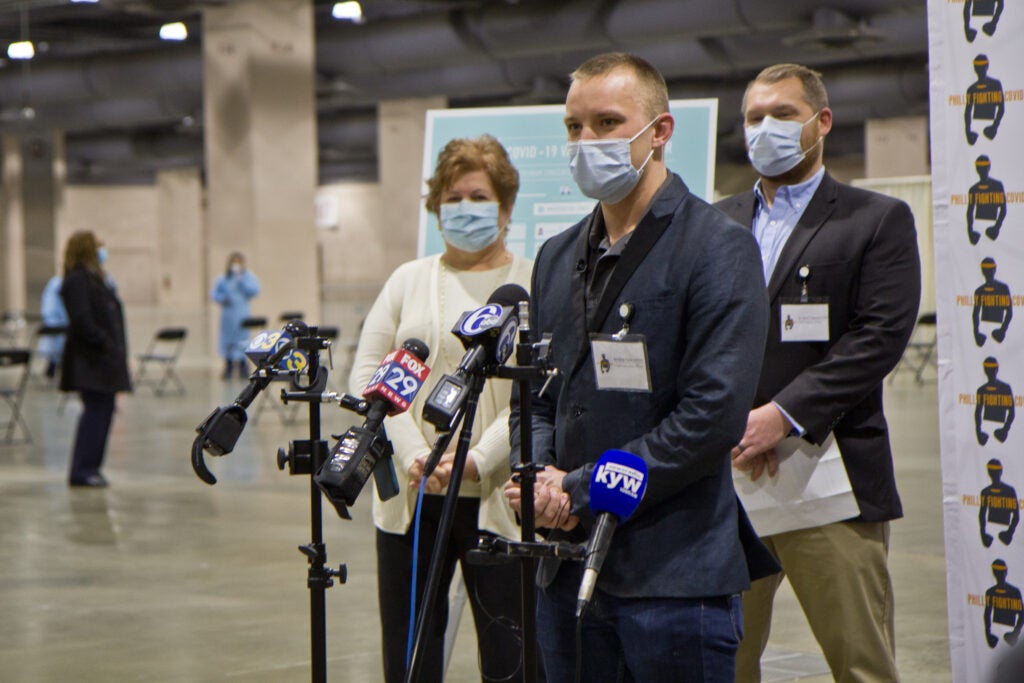
But Andrea Lawful Sanders, a local columnist and WURD radio host, was not surprised.
“I interviewed Dr. Farley, one time, before the [Philly] Fighting COVID debacle … and I found him to be barely tolerable of people that were not like him,” she said. “And I said as much as in my radio show, I told his people that I never wanted him back on the air with me, because I didn’t think that he understood other cultures and that he didn’t care to understand other cultures.”
Though Sanders did not call for Kenney’s resignation, she has tough questions for the mayor. Why, for instance, didn’t he send Farley packing earlier, such as after the Philly Fighting COVID episode?
Shortly after that happened, Sanders said, she reached out to the mayor’s office because she was so furious about the fact that the city had handed an inexperienced Drexel graduate student, Andrei Doroshin, the reins on vaccine distribution. She didn’t receive a response, she recalled.
She believes Kenney has mentally checked out.
“To me, it seems like he has disappeared. You know he’s there, but he’s not there … I’m not calling for him to resign. I’m calling for him to put people in place that can really get the city going again. Otherwise, his legacy is going to be null and void,” Sanders said.
Ferman said Kenney puts too much confidence in those around him to make the tough calls.
“Rightly or wrongly, the chief executive is the one who’s going to get the blame for everything — and it is coming back to haunt him, so to speak,” Ferman said.
In her statement to WHYY News, mayor’s office communication director Deana Gamble pointed to the city’s pre-K program and “regaining local control of the School District of Philadelphia to improve the quality of our public schools” as evidence of the success of Kenney’s administration. Gamble mentioned Philadelphia’s status as a Welcoming City and the city’s ongoing recovery from the pandemic as other markers of progress.
“Over the next 2 1/2 years, the Mayor aims to earn the trust of all Philadelphians while we drive an equitable economic recovery from COVID-19, advance our racial equity agenda, and work tirelessly to reduce gun violence, which has not only increased locally, but also skyrocketed across the nation. These are priority areas that the mayor will be personally immersed in throughout the remainder of his term,” Gamble said.
Unrelenting gun violence
If Mayor Kenney were to write a book like Richard Nixon’s “Six Crises” detailing the obstacles his administration has faced during his tenure, high on that list would surely be Philadelphia’s gun violence epidemic. As of June 1, 215 people had been fatally shot and 800 people wounded in 2021 alone. The numbers for 2020 were staggering: 2,200 shooting victims, 499 of them killed.
Though Kenney has begun to provide public briefings, there have not yet been signs of improvement in a record-setting public health emergency.
For North Philadelphia resident Vera Woolfolk, the epidemic came almost to her front door. Just last month, her daughter and grandson were held at gunpoint. Neither was hurt, but that doesn’t calm Woolfolk’s nerves.
“I thought I was gonna never see my kids again. You know, it’s really bad around here,” Woolfolk said.
Woolfolk is the director of the local drill team, the Princess Steppers, and she said some of her members have been threatened, too. She has contacted the police, but it’s getting close to the point where she is considering moving out of the area.
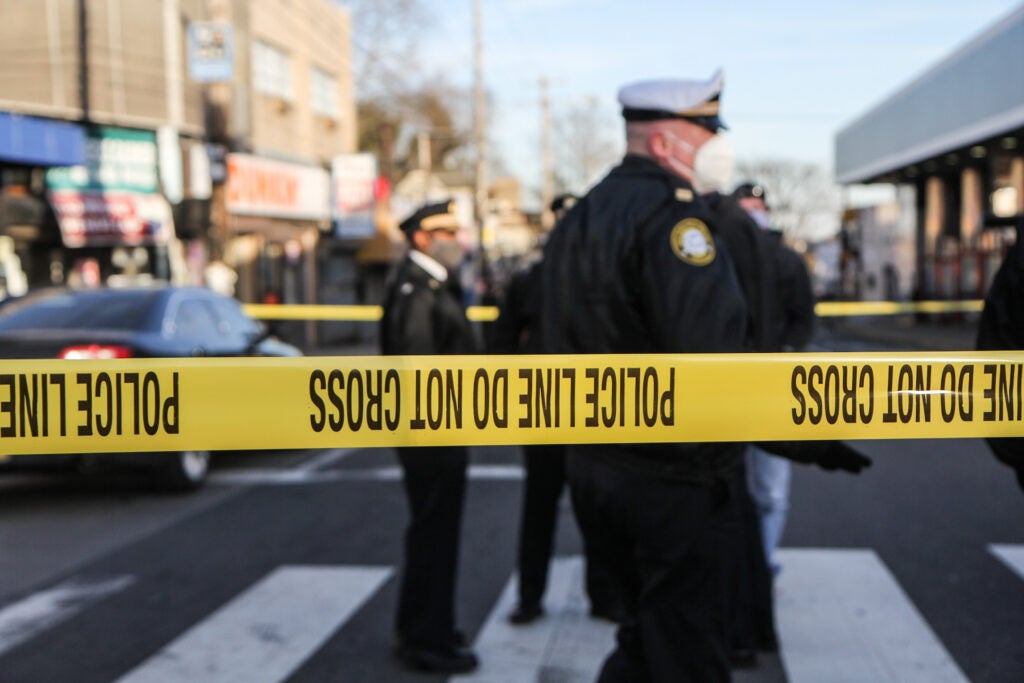
This is a hard issue to handle, she said, though ultimately she has faith in the Kenney administration and other local leaders.
“I have trust. I believe that they can do something about it — and I believe they will,” Woolfolk said.
Fareed Abdullah, a Philadelphia resident and aspiring politician, shared Woolfolk’s sentiment about the enormity of the challenge the gun violence crisis represents.
“To be honest, nobody really has the answers as to how to change the narrative that’s happening in the city of Philadelphia with gun violence,” Abdullah said.
Still, Abdullah doesn’t feel Kenney should be off the hook.
“I don’t feel like he has handled this good at all,” Abdullah said, adding that Kenney has attempted only “Band-Aid” solutions to gun violence.
Back in March, Abdullah was one of the organizers of a neighborhood rally to end gun violence in Southwest Philadelphia and said there hasn’t been much movement from the mayor to address the causes: a “failing” education system; a lack of adequate housing; and the extinction of extracurricular programs to keep kids off of the streets.
“There has to be so much more in order to change this, because even when his term is up, and he no longer is the mayor, we’re still gonna have these issues.”
Continuing disrespect
Tayyib Smith, a lifelong Philadelphian who works in marketing and real estate, said that as a child he watched the attack on the MOVE compound in West Philadelphia unfold on television. He said he felt as if he were watching it again with the Farley-MOVE scandal.
“The disrespect for the Black community, Black property, Black lives is continuing in my 50th year. And when I saw that … frankly, it’s hard for me to believe that Jim Kenney found out about that recently,” Smith said.
City government is “too complex” for blanket statements regarding trust, Smith said: He believes City Hall contains a wide array of people with differing agendas.
“I have a lot of empathy for the Black and brown people who work for the City of Philadelphia, who have to carry the responsibility of leadership that is absentee,” Smith said.
Councilmember Thomas said he sees the lack of trust in city government as nothing new — especially among his constituents of color.
“As the person who currently represents government every day, I have to remind myself that I represent an institution that has traditionally oppressed poor people and people of color,” Thomas said.
Trust is a complex thing, and recent events have not helped, he said.
“But I don’t want to pretend that these trust issues were just created with this administration or with these decisions or with the coronavirus pandemic,” Thomas said. “This lack of trust has been there since enslaved people have stepped on this soil.”
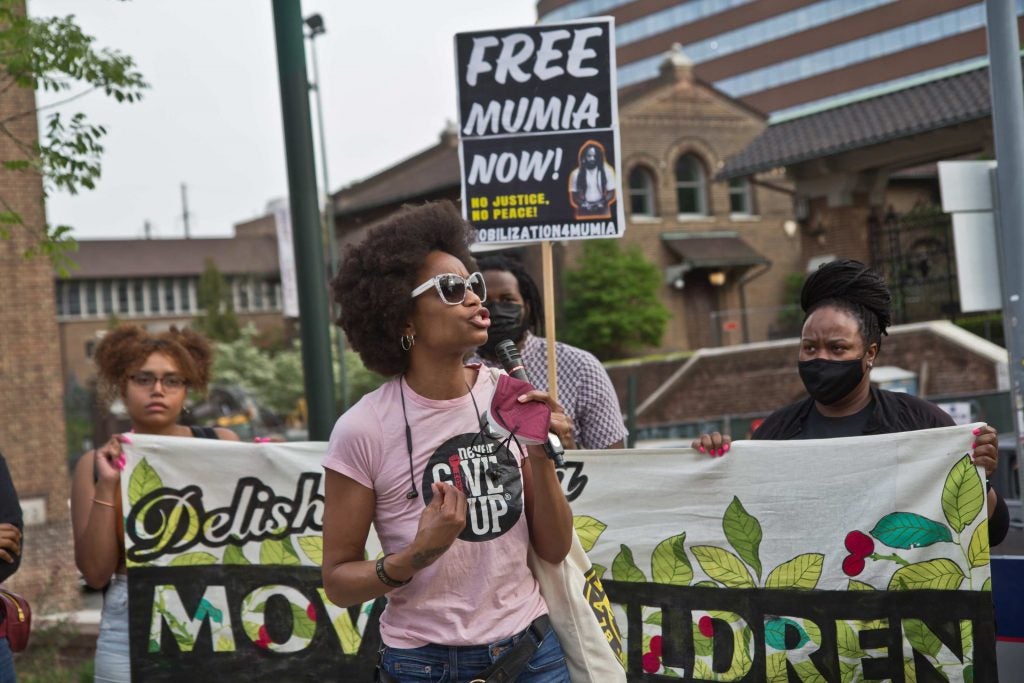
Just as the problem of trust in government is centuries in the making, it takes time to earn the public’s trust, he said.
Zamani, the filmmaker and photographer, grew up in the shadow of the MOVE bombing. As she sees it, the erosion of trust between the city and the community started with the mistreatment of MOVE.
She said she has one request for the city: “Do right by the MOVE family.”
“Until the city of Philadelphia admits to and is accountable for the very hard time Black people in Philadelphia had under Frank Rizzo, and his rise to power over the years, I don’t believe that anybody else will really have the trust of anybody … who’s Black in the city,” Zamani said.
To many, Rizzo’s racist, inflammatory rhetoric, and tough-on-crime tactics served as the fuel that would be lit by Mayor Wilson Goode when he allowed then-Police Commissioner Gregore Sambore to order the infamous bombing on Osage Avenue.
Since then, Goode, who was Philadelphia’s first Black mayor, has “accepted responsibility” for the bombing on his watch, and Kenney had the monument to Rizzo removed from in front of the Municipal Services Building amid last June’s racial justice protests. To a certain extent, Zamani said, Kenney just happened to be in office as people began calling for accountability.
Ferman, the Temple political science professor, said this is a period of “diminishing trust in government at all levels.”
“It just doesn’t help when you have a leader who appears to be kind of wishy-washy, which is what he does appear to be,” Ferman said of Kenney, while also acknowledging that the job is not a “cakewalk.”
But in the end, Zamani said, she is not confident that another hypothetical mayor would have handled the recent scandals any differently.
“People have to be accountable for the ways in which institutions and systems and entities in this country are anti-Black, or anti-woman, … and if you’re not going to address that,” Zamani said, “then it doesn’t really matter who’s in office.”

Get daily updates from WHYY News!
WHYY is your source for fact-based, in-depth journalism and information. As a nonprofit organization, we rely on financial support from readers like you. Please give today.



